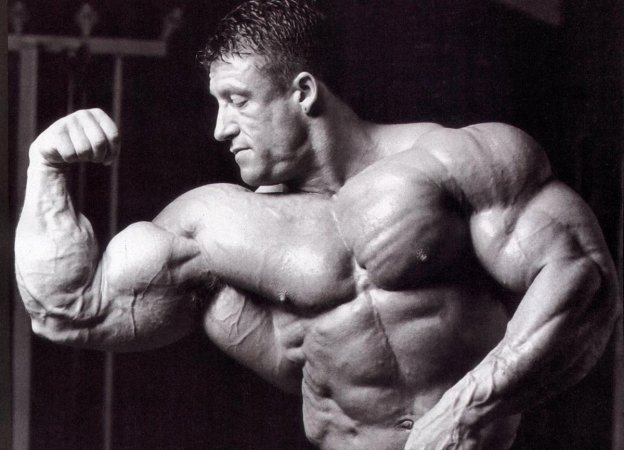It is not very often that a major newspaper considers asking a professional bodybuilder about what should be done with drug testing in elite sports. Perhaps the best we can hope for is a middle-level tabloid newspaper to take an interest. Well, today is our lucky day. Not only did the United Kingdom’s “Daily Express” newspaper interview a pro bodybuilder, they interviewed one of the greatest bodybuilders in the history of the sport – Dorian Yates.
Yates won the Mr. Olympia contest six consecutive times between 1992 and 1997. The Mr. Olympia is the “super bowl” of bodybuilding. Only three other bodybuilders have won more Mr. Olympia titles. Like Yates, these bodybuilders are household names at least for bodybuilding fans. Ronnie Coleman and Lee Haney each won eight titles and Arnold Schwarzenegger won seven.
Yates may have retired in 1997 but he remains a very popular bodybuilder even to this day. We applaud Gary Chappell of the Daily Express for seeking out an interview with the bodybuilder known as “The Shadow”.
The Daily Express published the Yates interview in five installments. The entire interview is a good read but for the purposes of this article, we’d like to focus on Yates’ remarks regarding anabolic steroids and drug testing in elite sports.
When asked about bodybuilding’s lack of popularity as a mainstream sport, Yates suggests it is not considered a real sport due to its close association with performance-enhancing drugs (PEDs) and particularly anabolic steroids.
“I never see bodybuilding on the sports page and it is not considered to be a sport because of the drug question, because of steroids,” said Yates. “Steroids are used, they are an integral part of professional bodybuilding.”
However, just because bodybuilding is essentially synonymous with steroids, it doesn’t mean that PEDs are not just as integral to success in other sports. Yates thinks the public is naive to think otherwise.
“People see these guys on TV and it is all squeaky clean. But it would be so naive to think that if you could take something that would increase your performance by whatever, two per cent, five per cent, 10 per cent, one per cent, even half a per cent, it is not being used,” Yates said. “People could not afford not to take it.”
The difference between steroid use in mainstream sports and steroid use in bodybuilding is honesty. Bodybuilders and the bodybuilding community are generally more honest about the role that drugs play in the sport’s success. Many bodybuilders will be completely honest about their own steroid use and its pervasiveness in bodybuilders. Others with speak in generalities but they still acknowledge that steroid use is an (accepted) part of the sport.
The honesty in bodybuilding is a consequence of the lack of drug testing according to Yates. Since pro bodybuilders are not tested in pro level contests promoted by the International Federation of BodyBuilders (IFBB), competitors are not afraid to be honest about what it takes to succeed in the sport. And it is widely recognized and accepted that this involves steroids.
Yates thinks the excessive drug testing protocols conducted by anti-doping organizations such as the World Anti-Doping Agency (WADA) are a waste of time. Drug testing doesn’t work very well. Most athletes are able to avoid detection. And the drug testing is rarely a deterrent for highly competitive athletes who seek every possible advantage available to them.
“Does anyone seriously think there are no drugs in Olympic sports just because they do some kind of testing?” said Yates. “They are highly competitive sports with highly competitive people and, just with competitive business, people do whatever they can to get ahead…”
Competitive bodybuilders may be inherently more honest about the ubiquitous use of steroids and PEDs in the sport. But Chappell is quick to point out the IFBB has been an official signatory to the WADA Code. Since 2003, the IFBB wants the world to think that it is anti-steroid.
The truth is that the IFBB isn’t really interested in promoting a drug-free sport. Its decision to partner with WADA was merely a marketing move to deflect attention from the widespread use of steroids among the pro ranks. The IFBB only tests amateur bodybuilders for steroids. Professional bodybuilders essentially receive a free pass to use all the PEDs they want.
What would the professional sports and Olympic sports look like if it abolished drug testing and adopted an approach similar to the IFBB’s monitoring, or lack of monitoring, of the pro ranks?
“It would be more honest if testing was abolished, insisted Yates. “With the drug tests throughout the ages, you actually create more of an imbalance because the people with the funding and the doctors can really avoid getting a positive and they will be at a bigger advantage than someone from a poor country or with less facilities. So does testing make it a fairer or even sport?”
Yates insisted that the discontinuation of drug testing and the abolishment of WADA is the best approach. We agree.

